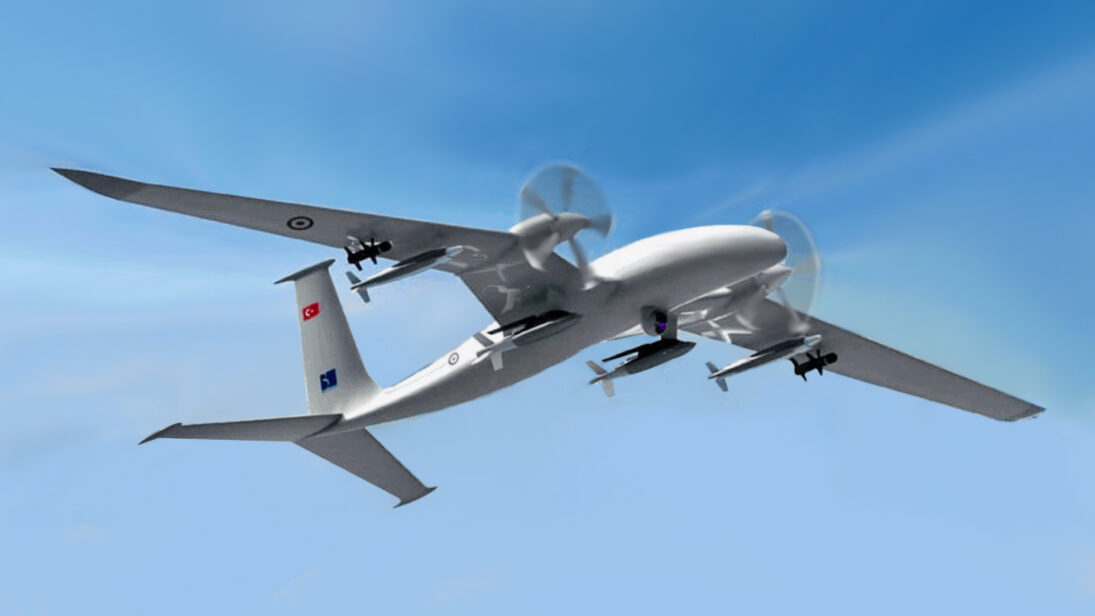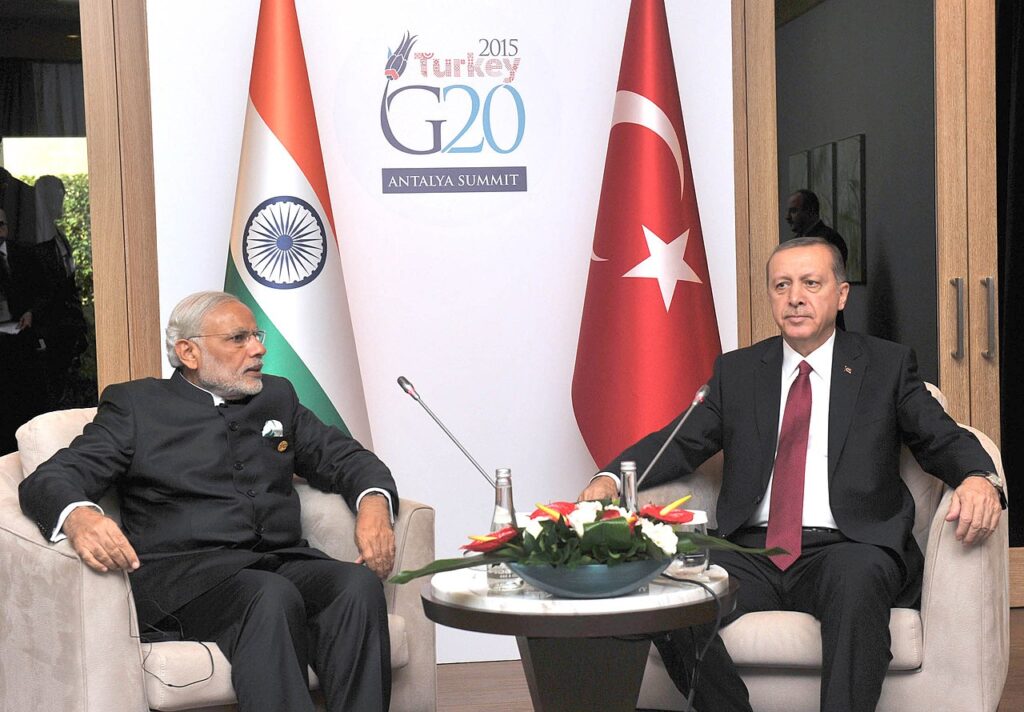
As the second Trump administration brings about major shifts in the global order, one executive order at a time, Europe finds itself in political turmoil, and the war between Russia and Ukraine grows increasingly precarious; an unlikely dynamic has come to light – one between two strategically autonomous rising powers that, in their own ways, embody the multilateral global order: Turkey and India.
Undoubtedly, India’s democracy and political landscape differ significantly from that of Turkey. But strategic considerations transcend ideological comparisons, demanding a pragmatic assessment of geopolitical dynamics. In this context, while India and Turkey share a complicated relationship, New Delhi should closely examine Ankara’s strategic posture; as their differences often obscure key strategic parallels. Turkey’s geopolitical conduct and defense partnership model offer a valuable reference for India as it leverages its geographic position, navigates strategic autonomy, and balances building on indigenous defense manufacturing while still deepening ties with the United States and the West in an increasingly unpredictable international landscape.
Complex India-Turkey Relations
The nuances of the New Delhi-Ankara dynamic manifest across various aspects of global politics, from a quasi-proxy war playing out in the Caucasus to rising tensions over the India-Middle East-Europe Economic Corridor (IMEEC) (where Turkey is notably absent), to President Erdoğan’s controversial remarks on Kashmir. This dynamic particularly plays out in the South Caucasus, where Turkey and India have backed opposing factions in the Azerbaijan-Armenia rivalry over Nagorno-Karabakh. Turkey has been a staunch supporter of Azerbaijan, supplying close to USD $106 million worth of weapons to Baku in 2023, whereas India has aligned closely with Armenia, emerging as its largest defense supplier and exporting close to USD $600 million worth of defense equipment to Yerevan by the beginning of 2024-2025. Simultaneously, Pakistan stands as one of Turkey’s largest defense markets, with a close partnership dating back to 1947. The trilateral relationship among Turkey, Pakistan, and Azerbaijan strengthened in the backdrop of the second Karabakh War in 2020, formalized through the Islamabad Declaration of January 2021 and the Baku Declaration later that year. For New Delhi, this trend is alarming, as Pakistan’s alignment with Turkey deepens India’s regional and border security challenges.
In this context, while India and Turkey share a complicated relationship, New Delhi should closely examine Ankara’s strategic posture; as their differences often obscure key strategic parallels.
The Turkey-Iran rivalry adds another layer to this geopolitical tapestry. Turkey’s differences with Iran are driven by regional competition, particularly in northern Syria. By contrast, Iran is a crucial partner for India in West Asia. India’s Chabahar Port agreement with Iran serves as a linchpin for India’s connectivity ambitions, forming part of the International North-South Transport Corridor (INSTC). India’s close ties with Iran, therefore, place it at odds with Turkey.
Ultimately, the strategic rift between India and Turkey is driven by their alignment with opposing regional powers, where both countries stand on opposite sides of a widening chasm of territorial disputes and regional conflict. However, this divide has shrouded similarities in their geopolitical postures — similarities which New Delhi should not ignore.
Turkey’s Model of Strategic Autonomy and Parallels with India
In their bid to position themselves as emerging powers commanding international recognition, both Turkey and India have adopted their own versions of strategic autonomy. For India, this has historically meant maintaining nonalignment and forging strategic partnerships with an array of partners, primarily to avoid dependence on any single major power. For Turkey, strategic autonomy manifests in balancing its NATO commitments with independent defense capabilities and a diversified foreign policy approach that engages both Western and non-Western actors.
While the political and geographical circumstances of India and Turkey have significant differences, there are still several parallels in balancing great power relations and lessons to learn when it comes to diversifying defense partnerships in an increasingly multipolar world. Turkey has gradually shifted from being a traditional Western ally to a strategically autonomous power, shaped by setbacks in relations with the and the United States. Turkey’s strategic footing and increased assertiveness have paid dividends, especially in the new world order, where Western powers grapple with existential challenges. Meanwhile, India has long sought to cultivate an image as a non-aligned and peaceful Global South power and a key representative for the Indo-Pacific amid the ongoing geoeconomic competition between the West and China. Similar to Turkey, India’s policy of strategic autonomy enables it to navigate multiple, even conflicting, partnerships: India actively engages with the Quad, the United States, and now Europe while maintaining strong ties with Western rivals like Russia and Iran.

Leveraging Geography
Turkey has anchored its geopolitical strength in its strategic geography as the eastern gateway into Europe and the western gateway into Asia. Turkey plays a key role in the Middle Corridor, which has gained prominence after the Russia-Ukraine war, and the Southern Gas Corridor – which is vital for Europe’s energy security. Thanks to its strategic location, Turkey can cultivate trade and defense ties with conflicting powers. It has notably boosted trade with China, balanced relations with regional rival Russia—including the integration of the Russian S-400 air defense system into its military—and maintained significant bilateral ties with several EU states and the United States.
In recent years, India has positioned itself as a similarly indispensable node for regional connectivity and has actively shaped and initiated major connectivity projects such as the INSTC and the IMEEC. But just as Turkey leverages its strategic location to sustain ties with rival powers, India can capitalize on its connectivity initiatives to advance indigenous defense exports and diversify trade partnerships, which remain somewhat constrained. For instance, even though India surpasses Turkey in overall export revenue, it lags behind Turkey in defense exports, both in revenue and export partnerships. In FY 2023-24, India generated USD $2.6 billion from defense exports, while Turkey earned over USD $7.1 billion. The key takeaway for India, therefore, is to expand its indigenous defense production and subsequently enhance its export capacity and network.
Turkey’s vision of cultivating a diverse network of partners to avoid dependence on any single country serves as an important lesson for New Delhi in its rapidly advancing partnership with Washington. Turkey exemplifies the usefulness of a diverse set of partners undergirded by a foreign policy that avoids excessive reliance on any singular power, helping insulate a country’s domestic and foreign policy priorities from changes in geopolitical alignment.
Building Defense Relationships and Self-Reliance
Turkey’s success lies in recognizing its strengths and possessing the acumen to leverage them. Despite notable setbacks, including the failure to secure EU accession and U.S. support for Kurdish forces in Syria, Turkey has positioned itself as an indispensable defense partner for Washington, particularly through its indigenous technology. In the past ten years, Turkey has increased its defense exports by 106 percent. Last year alone, the figure exceeded USD $7 billion, driven by game-changing indigenous systems like the Bayraktar — an unmanned aerial vehicle most notable for its significance in the Ukraine War due to its precision strikes and cost-effectiveness. Turkey’s emphasis on indigenous defense innovation has bolstered its domestic security capacity and cultivated increased international interest in its growing defense industry. Uniquely, Turkey balances its NATO membership with a defense identity distinct from traditional Western powers.
Similarly, India should aim to further capitalize on its growing strategic importance as both a Western ally and a Global South representative by diversifying its defense partnerships – reducing reliance on the United States and focusing and strengthening its autonomy in an actionable strategic sense. The EU’s experience with Trump highlights the risks of overdependence in an unpredictable global order focused on nation-first politics. India’s strategic positioning as a Quad member and key Indo-Pacific player focused on regional stability, highlighted by its “Neighborhood First Policy,” presents a unique advantage to build broader defense ties.
India seeks both the development and manufacturing of independent, self-sustaining defense capabilities and wider recognition of its indigenous defense technology. In order to achieve this, India should focus on developing niche defense systems that address unmet global demand by identifying gaps in the market, just as Turkey has done with the Bayraktar and other defense technologies supplied to the EU. The key factor is offering cost-effective solutions with proven capabilities, which would also make Indian defense exports more attractive on the global stage. Another substantial takeaway for expanding defense exports is to examine how Turkey’s export policies have facilitated numerous defense agreements.
India’s Path Forward
In an effort to reduce excessive dependence on foreign partners and advance domestic defense production and innovation, India has sought to co-produce essential defense equipment with the United States, including jet engine technology, MQ-9B drones, and combat vehicles such as the Stryker. However, Turkey’s defense strategy offers valuable insights for India as it seeks to expand its global defense footprint while maintaining strategic autonomy. Turkey has successfully leveraged factors such as geography to push forward its defense exports and build a diverse network of partners across Europe, South Asia, West Asia, the Middle East, Africa, and beyond. For India, there is significant potential to similarly diversify its defense engagements and strengthen its position in the global market.
Indigenous defense innovation and production will be key if India aims to become the third-largest economy by the end of this decade. Strengthening its defense sector could also help India navigate potential economic slowdowns by driving domestic manufacturing, increasing exports, and reducing external dependencies. By tapping into new markets, fostering private sector partners, investing in innovation, and refining its defense export strategy – similar to moves Turkey has made – India can position itself as a key player in the evolving defense landscape.
By tapping into new markets, fostering private sector partners, investing in innovation, and refining its defense export strategy – similar to moves Turkeyhas made– India can position itself as a key player in the evolving defense landscape.
To achieve this, India must ensure its export defense network extends beyond traditional allies, deepening engagements in Southeast Asia, Africa, and the Middle East. Although the EU and India are set to sign a Free Trade Agreement by the end of the year, a coherent defense partnership strategy remains to be seen.
Simultaneously, promoting both private and public investment in indigenous R&D and production will be crucial for India in developing cost-effective, combat-proven defense technologies that address global demand by identifying market gaps—much like Turkey’s success with the Bayraktar drone. Turkey has been able to do this through fast-paced collaboration with a handful of private firms, enabled by flexible policies, special funding, and swift acquisition processes, and tested its indigenous technology in active conflict zones–a model that New Delhi can aim to emulate. On the export side, India should adopt a proactive strategy, which would require streamlining policies, reducing bureaucratic hurdles, and ensuring a targeted effort to promote Indian defense technology on the global stage.
Furthermore, India can leverage its strategic geography—as a Quad member and an Indo-Pacific gateway—to attract international defense collaborations and integrate itself into global supply chains. Using Turkey’s example, India can push the export of indigenous defense technology by capitalizing on its multiple connectivity projects to create new markets and enhance its global defense footprint. Above all, in an increasingly multipolar world, rather than become dependent on a singular partner, India’s defense strategy should remain autonomous, flexible, and resilient.
The article appeared in the southasianvoices
